WAINGMAW, Kachin State – Flanked by banana plantations stretching as far as the eye can see, the road to Shwe Nyaung Pin Village in Waingmaw Township in Kachin State is profoundly green. In late October, they were almost ready to harvest. The final destination of the fruit is the shelves of supermarkets in neighboring China, not Myanmar.
Waingmaw hosts most of the banana plantations backed by Chinese businesses, along with those near the Kachin State capital, Myitkyina, and nearby Bhamo Township. Dubbed tissue-cultured bananas, the green bananas are bigger than the normal yellow fruit and they are grown with Chinese technology.
They need special treatment and insecticides, mostly in the early stages, and are wrapped in plastic sheets and foam to prevent insect infections.
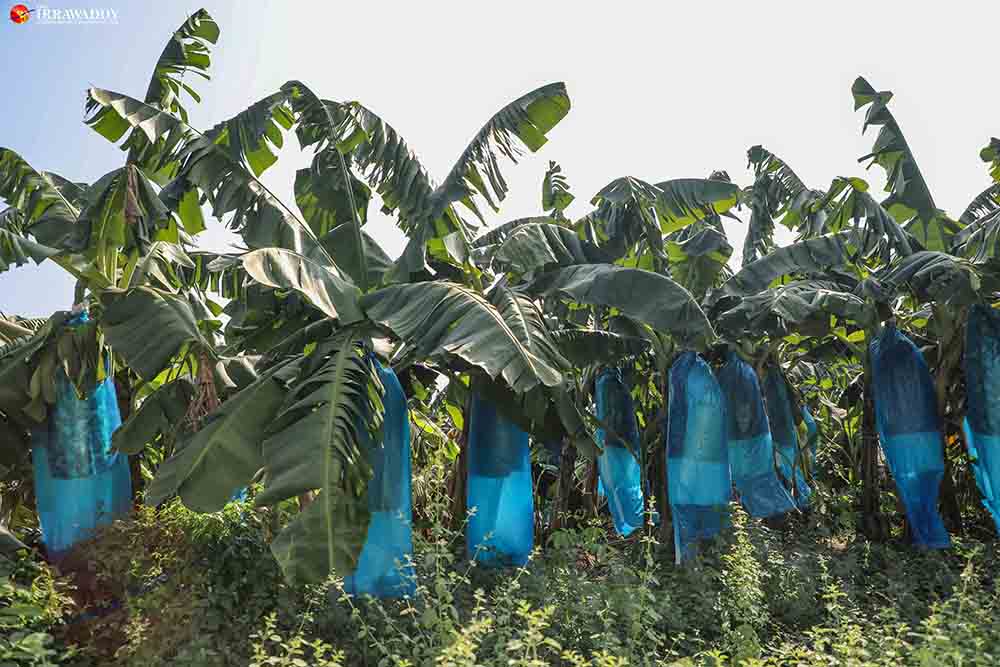
After harvesting, the plantations are left strewn with rejected bananas, pesticide bags and abandoned plastic sheets.
In the decade since the Chinese-backed banana plantations first appeared in Myanmar, more than 100 companies have leased tens of thousands of acres in Waingmaw, Myitkyina and Bhamo townships.
Traditional crops such as paddy, corn, chilies and watermelon have a limited market, so many farmers have leased their land to the Chinese-backed companies.
For Kachin farmers, selling their crops cannot compete with the lump sum of 200,000-300,000 kyats (about US$130-200) per acre each year they make from leasing their land. (An acre is equal to 0.4 hectares.) Farmers are now seeing the consequences of the plantations. The pesticides used on the bananas are affecting the naturally grown crops, farmers claim.
Land ownership disputes have arisen because many farmers use customary land tenure and they did not have the formal registration.
Social problems have also been caused by an influx of migrants from elsewhere in Myanmar and China.
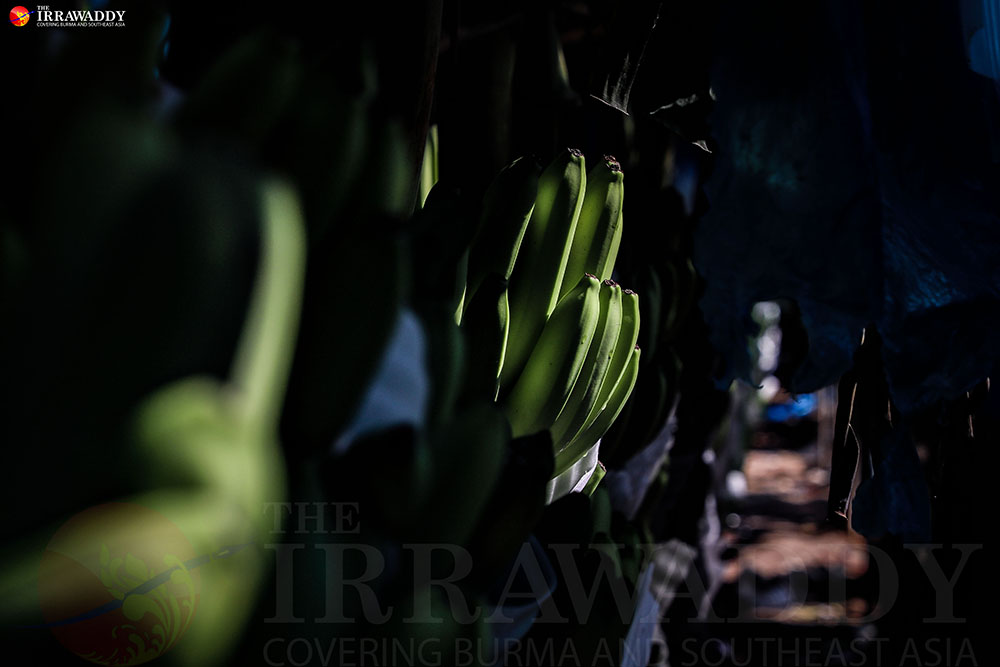
Legislation to address land disputes
So far, the land disputes have been addressed “through social means” at the community level without using the courts, said Daw Doi Bu, a former Lower House parliamentarian and advocate based in Myitkyina. She said the plantation companies and the landlords contracting the land have signed a variety of contracts.
The plantation contracts include no binding agreement on the preservation of the land and the environment. Civil society groups, activists and lawyers have voiced concerns about what will happen after the banana plantations leave.
After 2011, fighting resumed between the Kachin Independence Army and Myanmar’s military (the Tatmadaw). The plantation companies chose to invest in government-controlled Waingmaw but some villages have been abandoned by fleeing Kachin farmers.
According to Ma Zin Mar Aye of the Waingmaw Women’s Network, the landlords in Aung Myay Thit Village in the township are told by these companies that the land will be used for seven years for banana plantations and then the soil will need time to recover.
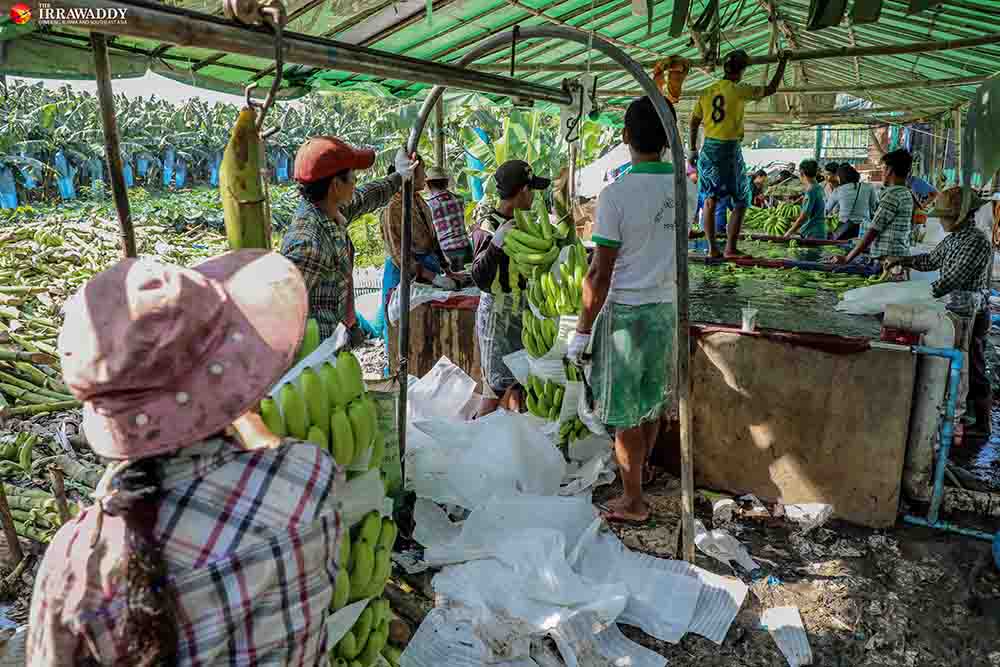
It is uncertain if the land will be returned to the original farmers, Ma Zin Mar Aye told The Irrawaddy. She said some of the land has been used for four years and farmers are wondering how to restore the soil.
Traditionally, farmers grow a variety of crops throughout a year to naturally fertilize the soil. But now only bananas have been grown for years.
There could also be problems with redistributing the land to the original farmers.
“The landscape has changed from forest and farms to just banana fields,” Ma Zin Mar Aye said. Farmers traditionally “marked their land with trees and hills rather than the official registration maps”.
“All those marked trees and plants were removed [to make way] for the banana fields so it could be a problem to return the land to the original farmers,” she added.
There were concerns that Myanmar did not have legal restrictions on land use by the banana plantations and there was no specific law to deal with the issue, lawyer Daw Doi Bu said.
She added: “We need a law indicating how the land-lease process should work to measure the quality of the soil before the plantation opened and after it left, setting legal requirements to take action against violators. This would help to protect the land from degradation due to the excess uses of insecticides or fertilizers from the plantation companies.”
She added that some banana plantation contracts have almost come to an end and the government needed to decide quickly on whether to enact legislation, either at the state or Union level.
“Many of these banana plantations are illegal but the governments tax them,” said Daw Doi Bu, citing the Kachin State cabinet’s answer to the state parliament last year that the plantation investments were allowed under the previous government.
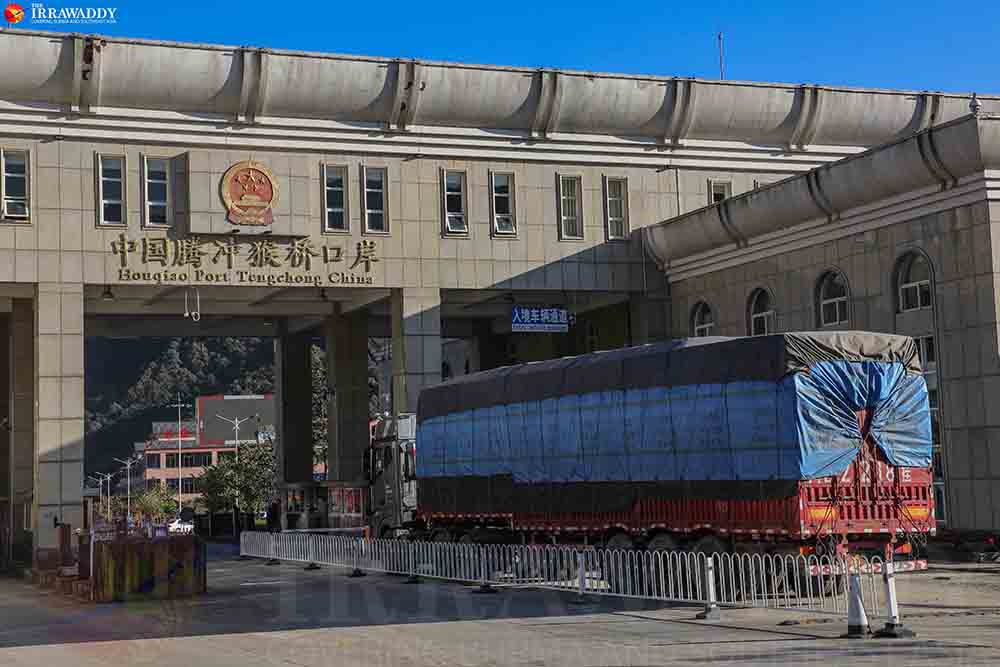
Waingmaw Township began collecting taxes from the banana trucks during the 2017-18 fiscal year, at 80,000 kyats (US$53) per truck.
There were 15,000 trucks that year, according to the state government. Each truck also had to make a separate payment at the township checkpoint of 20,000 kyats (US$13), which was revoked last year.
In the 2018-19 fiscal year, the township received almost 2.25 billion kyats (US$1.5 million) in taxation from 28,100 trucks. It collected 17 percent of the total municipal income of Kachin State last year and used it for the development of road infrastructure.In October this year, there were 980 trucks transporting bananas to China—twice as many as in October 2018.
Despite the income, rural development is slow. As The Irrawaddy witnessed, road access is still limited and dirt roads with gravel make for slow and costly public transport.
Myanmar has developed policies on land protection in the Union Accords, signed in May 2017 and July 2018, during the Panglong peace talks. The measures say the government must preserve land which is vital to historic buildings and people’s identities and maintain the natural environment. It said the government should prepare to assess whether projects would damage society, health and the environment, and consult communities before allowing development. They say no foreigners can own land.
But these policies have not yet been imposed because peace talks have stalled.
Before the Union Accords are finalized, adopting legislation to deal with the current problem was “the right approach”, Daw Doi Bu said.
Currently, the registered land document is a solution to deal with land disputes, but farmers fear losing their land even if they have a registration form.
Daw Mya Thway San, a Kachin State parliamentarian for Mogaung, said people who lease their land should have Form 7, a registered document allowing the right to sell or buy land, so they should not worry about losing their land.
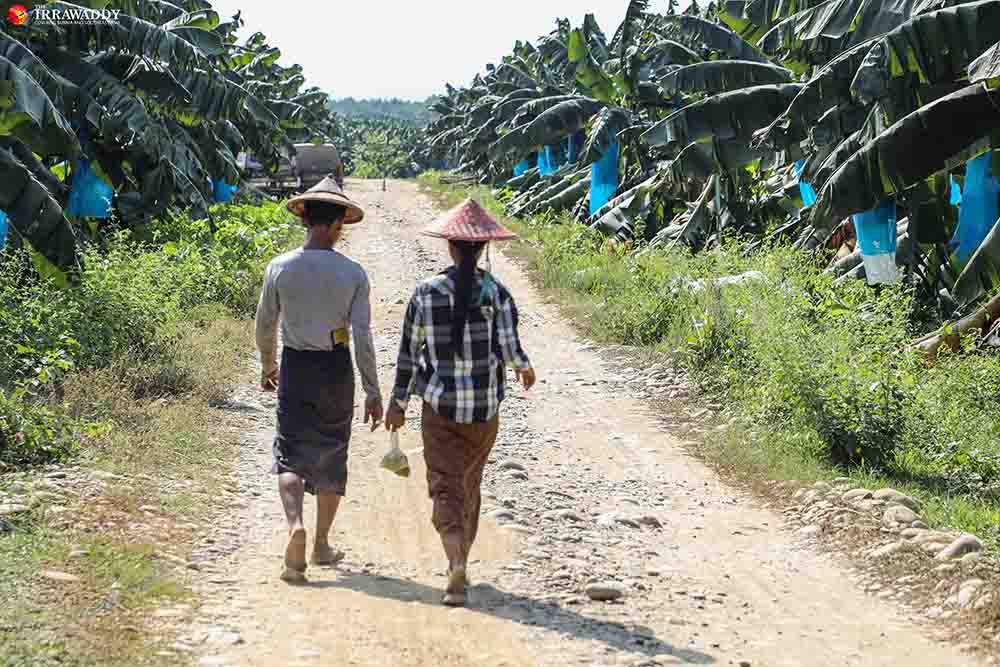
Internal migration
At a plantation in Shwe Nyaung Pin Village, workers were busy processing bananas to be transported to China.
They carefully cut and clean the fruit, dip the bananas into water mixed with antibiotics and benzylpenicillin sodium, then dry, weigh, box and load them into trucks heading to China.
Most of the laborers are from elsewhere in Myanmar.
Many are from Mogaung in Kachin State and Katha, Tigyaing and Kawlin townships in Sagaing Region.
They live in huts next to the plantations and their daily wage ranges from 6,000 to 10,000 kyats (US$4-6.7) per day.
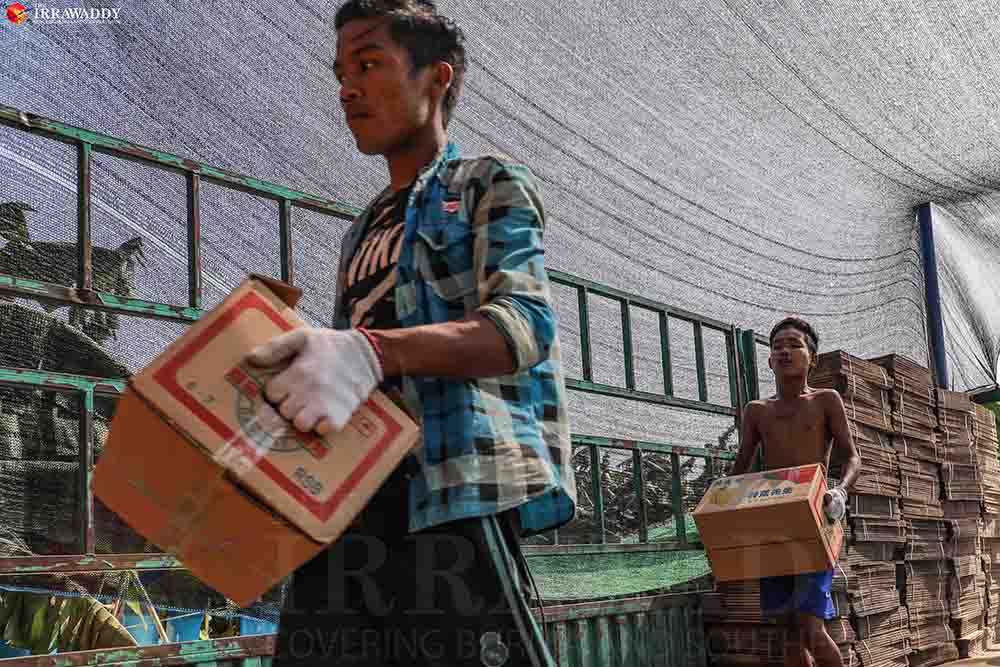
Ko Pyone Cho from a village in Katha said his family and other villagers came because they could earn enough money to feed their family. He said their income was 6,000 kyats per day, which may be less than many Kachin residents earn extracting natural resources like amber, jade and gold.
“But compared to our income from paddy and seasonal vegetables, our daily income helps us. Therefore, many of our neighbors have come to the plantations,” said Ko Pyone Cho.
Daw Baydar from Intawlay in Katha makes plastic and foam sheets at the Sut Bum company in Shwe Nyaung Pin Village. She earns around 10,000 kyats per day, about twice what she would earn farming in her village for easier work.
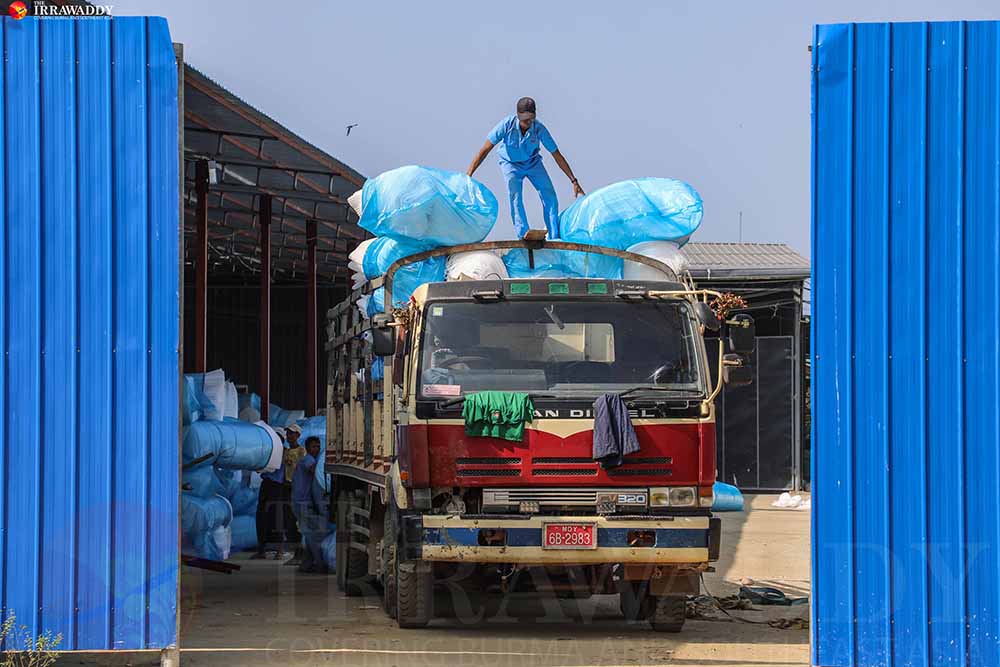
Health concerns
Staff at the plantations nearer to the town have more chance of getting paid full wages and have fewer health concerns than those in more remote areas, added Ko Pyone Cho, who has worked for different plantations for three years.
He said he currently works near the town and there is regular monitoring over the use of the insecticides.
“If the use of the insecticide is strong, it will be detected easily and then the government inspectors come,” he added.
But Ko Pyone Cho said the excessive use of insecticides was widespread in remote villages in Waingmaw. He said he had seen other workers suffering from illnesses.
Groundwater and streams are also reportedly drying up, leading to calls for the plantations to be closed.
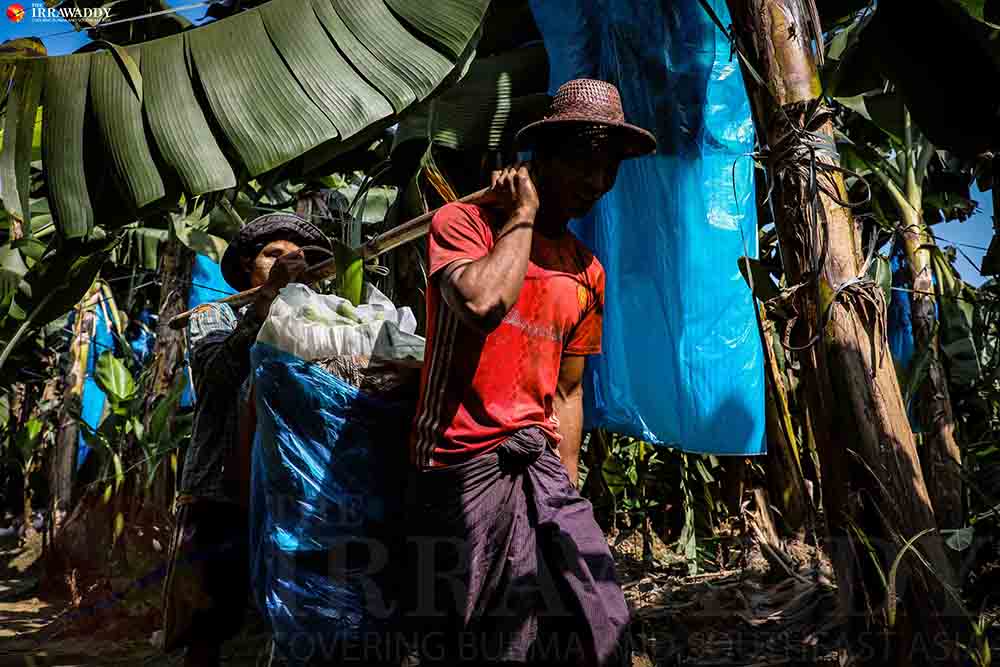
Labor exploitation
On the road to the Chinese border in Waingmaw Township, numerous trucks carry tons of banana boxes to China on the Sadone-Kan Paik Ti route. Each truck is loaded with green bananas from more than 900 banana plants, laborers told The Irrawaddy. In the harvest season, Waingmaw residents said about 50-60 banana trucks pass each day.
The banana plantations provide few jobs for Kachin residents and allow the exploitation of workers from outside the area, according to civil society groups. A study called “Banana Plantations and their Impact on Women” was recently conducted by NGOs in Myitkyina and Waingmaw.
Nang Pu, the director of the Myitkyina-based Htoi Gender and Development Foundation, said the companies would rather employ migrants than residents to avoid complaints.
“Villagers complain if the wages are low,” said Nang Pu. “They want staff to work every day but many Kachin are Christian and take Sunday off.”
Most laborers were far from home and they had no one to help them in disputes, added Nang Pu.
She told The Irrawaddy: “They would not get full wages. Even if they were promised 10,000 kyats per day, some only earn 5,000-6,000 kyats a day, while others only get 2,000 kyats per day. But they cannot demand higher pay. No one cares for them.”

But around 200,000 staff are employed on the plantations, parliamentarian Daw Mya Thway San said, adding that if the government collected taxes properly and used the money for development, Kachin State would prosper. Also, the migrant workers would not lose their jobs, she added.
Despite these troubles, investment is ongoing and due to extend into Mandalay and Sagaing regions and Shan State, according to Dr. Khun Win Thaung, an Upper House parliamentarian for Kachin State.
The Upper House on Wednesday approved his proposal urging the union government to systematically control banana investment, avoid future problems and properly collect taxes.
Many Kachin residents oppose monocultural investment.
Zau Mai, a Kachin internally displaced person who is currently sheltering at the Mung Na Baptist Church camp in Waingmaw, said the banana investment needed to stop.
He was from Bhamo Township’s Sha Dan Pa Village, which hosts huge banana plantations, and has worked in several jobs with the fruit for six years until he stopped in 2018.
“I had to use excessive insecticides, various fertilizers and an enormous amount of water. The water came from streams and was pumped back infected with pesticides that killed the fish,” he said.
He added that insects were becoming immune to pesticides.
“I realized after I joined an awareness group on the environmental consequences of pesticides that bad smells harm our health and the environment. So I quit. I no longer want to work on the banana plantations,” he added.

















